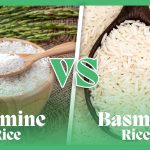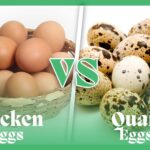Eggs, both chicken and duck, have long been a mainstay in people’s diets across the world, providing a flexible and nutrient-dense food source. These oval beauties not only add to the culinary variety, but they also pack a nutritional punch, making them an essential element of a well-balanced diet. So let’s have a look at the properties of chicken and duck eggs, as well as their nutritional profiles and the relevance of including these protein-rich treats in our daily diets.
As we explore the world of food, we’ll uncover the healthy mix found within these tasty little treats. Beyond the breakfast plate, each egg variety has a distinct makeup that goes well beyond flavor and texture. Join us as we break open the shell of knowledge to investigate the varied nutritional profiles and health advantages of chicken eggs versus duck eggs.
Prepare to be informed, because the simple egg is a nutritious gem just waiting to be uncovered!
Chicken Eggs:
Available in many sizes and colors, chicken eggs are the most consumed eaten eggs worldwide. There isn’t much of a nutritional difference between the widely preferred types of eggs: brown and white. They are composed of a rich, golden yolk encased in a protective shell made of egg white or albumin. Chicken eggs are well known for being readily available, reasonably priced, and having a wide range of culinary uses.

Duck Eggs:
Duck eggs are a common ingredient in many Asian cuisines, but are less common in Western diets. Usually with a thicker shell, they are bigger than chicken eggs. People allergic to chicken eggs can use duck eggs as a substitute since they have a more complex flavor profile. Furthermore, duck eggs contain somewhat greater fat and protein density than chicken eggs.

Nutritional Comparison:
Eggs are a nutritional powerhouse with a multitude of health advantages, whether they come from chickens or ducks. Because they contain every important amino acid required for human health, they are a great source of high-quality protein. Eggs also include a lot of important vitamins, such as riboflavin, choline, and B12 vital for healthy brain function and general well-being.
Selenium, an antioxidant that shields the body from oxidative stress, is one of the many elements found in eggs. Improved satiety, better weight control, and a lower chance of developing several chronic illnesses have all been linked to adding eggs to the diet. Other nutrients found in various levels in chicken and duck eggs include choline, lutein, zeaxanthin, and omega-3 fatty acids.
| Nutrient | Chicken Egg (per 100g) | Duck Egg (per 100g) |
|---|---|---|
| Calories | 143 | 185 |
| Protein | 13 g | 12.8 g |
| Fat | 9.71 g | 13.8 g |
| Saturated Fat | 3.1 g | 4.4 g |
| Monounsaturated Fat | 3.7 g | 5.8 g |
| Polyunsaturated Fat | 1.4 g | 1.8 g |
| Cholesterol | 372 mg | 884 mg |
| Carbohydrates | 1.1 g | 1.2 g |
| Sugars | 1.1 g | 0.56 g |
| Calcium | 56 mg | 62 mg |
| Iron | 1.8 mg | 3.68 mg |
| Magnesium | 12 mg | 19 mg |
| Phosphorus | 198 mg | 188 mg |
| Potassium | 138 mg | 142 mg |
| Sodium | 142 mg | 71 mg |
| Zinc | 1.29 mg | 2.71 mg |
| Vitamin C | 0 mg | 1.5 mg |
| Thiamin (B1) | 0.04 mg | 1.5 mg |
| Riboflavin (B2) | 0.46 mg | 0.52 mg |
| Niacin (B3) | 0.06 mg | 0.4 mg |
| Pantothenic Acid (B5) | 1.4 mg | 1.4 mg |
| Vitamin B6 | 0.16 mg | 0.2 mg |
| Folate (B9) | 47 µg | 58 µg |
| Vitamin B 12 | 1.11 µg | 3.8 µg |
| Vitamin A | 487 IU | 1267 IU |
| Vitamin D | 87 IU | 220 IU |
| Vitamin E | 1.03 mg | 1.97 mg |
| Vitamin K | 0.3 µg | 2.8 µg |
| Choline | 294 mg | 296 mg |
| Lutein and Zeaxanthin | 220 µg | 622 µg |
| Omega-3 Fatty Acids | 0.58 g | 0.74 g |
Cooking Characteristics and Versatility:
Duck and chicken eggs have varied cooking methods and tastes; therefore each offers unique gastronomic benefits. Eggs from chickens are highly valued for their adaptability. The coagulating capabilities of the egg whites enable them to perform well in a variety of preparations, such as baking, and the emulsifying power of the yolk adds richness to sauces and custards.
On the other hand, duck eggs with greater fat content; give baked items like cakes and pastries a creamier texture, and their strong taste complements savory foods like omelets and quiches. By providing chefs with a variety of textures and flavors to choose from, these eggs enhance the whole culinary experience and offer a wealth of creative cooking choices.
Role in Human Nutrition:
Muscle Development & Tissue Repair:
High-quality proteins, essential for tissue repair and muscle growth are found in chicken eggs. Rich in vital amino acids, they promote optimal bodily operation. Eggs are great to add to your workout diet since they help maintain and increase lean muscle mass. Appropriate for all ages due to their adaptability and simplicity of digestion, eggs are a nutrient-dense supplement as they provide vital vitamins and minerals in addition to protein. (1)
Brain Health:
Eggs, especially the yolk, are a good source of choline. Its critical function in maintaining general brain health makes this important vitamin stand out. Neurotransmitter synthesis is greatly aided by choline, which also helps nerve cells communicate effectively with one another.
Moreover, it is essential to the preservation of cell membrane integrity, which guarantees the right operation of the membranes. People may capitalize on the advantages of choline, which supports cellular health and cognitive function, by including eggs in their diets. (2) Duck eggs, like chicken eggs, are a high source of choline that supports liver health and cognitive function. (3)
Aids in the formation of Red Blood Cells:
Nutritional powerhouses, chicken eggs are especially high in vital B vitamins. Vitamin B12 is a prominent component that promotes energy metabolism and aids in the production of red blood cells. This essential vitamin is necessary to avoid anemia and to keep the neurological system functioning normally.
Another B vitamin included in eggs is riboflavin, which helps convert food into energy and supports a healthy metabolism in general. Folate, another B vitamin is necessary for healthy cell division and growth since it is involved in DNA synthesis and repair. Including eggs in your diet will help guarantee that you receive enough of these vital B vitamins, which support several body processes and enhance general health. (2)
Contributes to Immune Functioning & Bone Health:
Eggs are a nutrient-dense food rich in vitamins A and D. Retinoids, which are eggs’ version of vitamin A, are essential for preserving good eyesight and advancing the health of your eyes overall. It helps avoid night blindness and supports the retina’s healthy operation. Eggs are also a natural source of vitamin D, which is essential for strong bones and a healthy immune system.
This vitamin supports the growth and maintenance of healthy bones and teeth by assisting in the absorption of calcium and phosphorus. Including eggs in your diet is an easy and accessible way to make sure you get enough of these vital vitamins, which helps you maintain a comprehensive approach to your general health and well-being. (4)
Regulate Thyroid Functioning:
In terms of thyroid function specifically, eggs provide the equilibrium needed for this important gland. Producing hormones that affect metabolism, the thyroid gland is a tiny, butterfly-shaped structure located in the neck. One essential ingredient in these hormones is iodine, which may be found in foods like eggs. A thyroid gland that does not get enough iodine may find it difficult to create enough hormones, which might result in problems like hypothyroidism.
Nutritional Health Benefits of Duck Egg:
Duck eggs stand out as a nutritional powerhouse with a higher protein and fat content compared to chicken eggs. Their impressive array of vitamins and minerals, including vitamin B12, iron, and selenium, make them a valuable addition to a well-balanced diet. While their cholesterol content should be considered for those with specific dietary concerns, the unique taste and culinary versatility of duck eggs make them a noteworthy choice for those seeking to diversify their nutritional intake and culinary experiences.
Promote Heart Health:
Duck eggs’ high omega-3 fatty acid concentration makes them a nutritional powerhouse with potential benefits for the heart and inflammation. Duck eggs are known to have larger quantities of omega-3 fatty acids, namely alpha-linolenic acid (ALA), than chicken eggs. These vital fatty have positive effects on the cardiovascular system, which include decreasing blood pressure and preventing blood clotting to support heart function.
Furthermore, omega-3s have anti-inflammatory qualities that may reduce inflammation all over the body and improve general health. Duck eggs include more of these fatty acids than other foods, which might be beneficial for those who want to improve their cardiovascular health and deal with inflammation. (5)
Prevent Age-related Macular Degeneration:
The antioxidants lutein and zeaxanthin, which are essential for maintaining eye health and lowering the risk of age-related macular degeneration (AMD), are abundant in duck eggs. By building up in the macula of the retina, these carotenoids shield the retina from damaging light rays. Due to their high lutein and zeaxanthin content, duck eggs are a great food option for maintaining good eye health.
By avoiding oxidative stress and cell damage in the eyes, these antioxidants help neutralize free radicals and lower the risk of age-related disorders including AMD and cataracts. Duck eggs’ high-fat content maximizes the potential advantages of these fat-soluble substances by improving their absorption.
Duck eggs may be a delicious method to guarantee a steady intake of these vital nutrients by including them in a variety of meals. A higher dietary intake of lutein and zeaxanthin is linked to a lower risk of AMD, which is the primary cause of visual impairment in older persons. (6) These antioxidants’ protective qualities help to preserve the macula, which is in charge of central vision, and its functionality.
Adverse Effects of Chicken Egg & Duck Egg:
Common Allergen:
Allergies to chicken eggs are frequent, especially in younger people. The proteins in egg whites are frequently linked to egg allergy, which can have moderate to severe symptoms. (7) Because duck eggs differ in their protein content from chicken eggs, they are a good substitute for those who are allergic to chicken eggs. Although cross-allergenicity still exists, some people discover that they can handle duck eggs more easily. (8)
Salmonella Contamination:
Eating raw or undercooked eggs might put you at risk of contracting foodborne diseases caused by the bacteria Salmonella. Foods like homemade mayonnaise, minimally cooked eggs, and uncooked cookie dough are especially linked to this risk. Symptoms of salmonella infection include fever, gastrointestinal trouble, and cramping in the abdomen. Cooking eggs thoroughly until the yolks and whites are set aids in removing Salmonella.
Cholesterol Content:
People who diligently watch their cholesterol consumption should take into account duck eggs because they are known to have greater cholesterol content than chicken eggs. It’s critical to understand that, similar to chicken eggs, individual differences might affect how dietary cholesterol affects blood cholesterol levels. Some people may notice a considerable rise in cholesterol after eating duck eggs, whereas others might not notice any change at all. (9)
Chicken and duck eggs bring unique qualities to the kitchen. Chicken eggs, known for versatility, enhance sauces and baked goods, while duck eggs, with higher fat content, add a distinct taste and creamier texture to pastries.
Experimenting with both types opens up a world of flavors, elevating the culinary experience. Both chicken and duck eggs have their distinct charms in the fun argument. Regardless of your preference for chicken or duck eggs, both provide an incredible range of nutrients. In the end, dietary requirements and personal inclination will determine the decision.
Irrespective of your preference for a sunny-side-up or fluffy omelet for breakfast, embrace the excitement of finding out which creation from your feathery buddy best meets your palate and health objectives. Whichever option you select, just don’t forget to smile and appreciate the deliciousness that each egg adds to your meal!
Cheers to egging!
References:
- https://doi.org/10.3945/jn.114.195438.
- https://doi.org/10.1146/annurev.nutr.26.061505.111156
- https://doi.org/10.1093/ajcn/87.2.424
- https://doi.org/10.1007/s11914-009-0020-5
- https://doi.org/10.1093/ps/81.1.30
- https://doi.org/10.1017/S0007114508163000
- https://doi.org/10.1016/j.jaci.2007.09.040
- https://doi.org/10.1097/ACI.0b013e32833e3715
- https://doi.org/10.1016/j.fsi.2012.11.008









